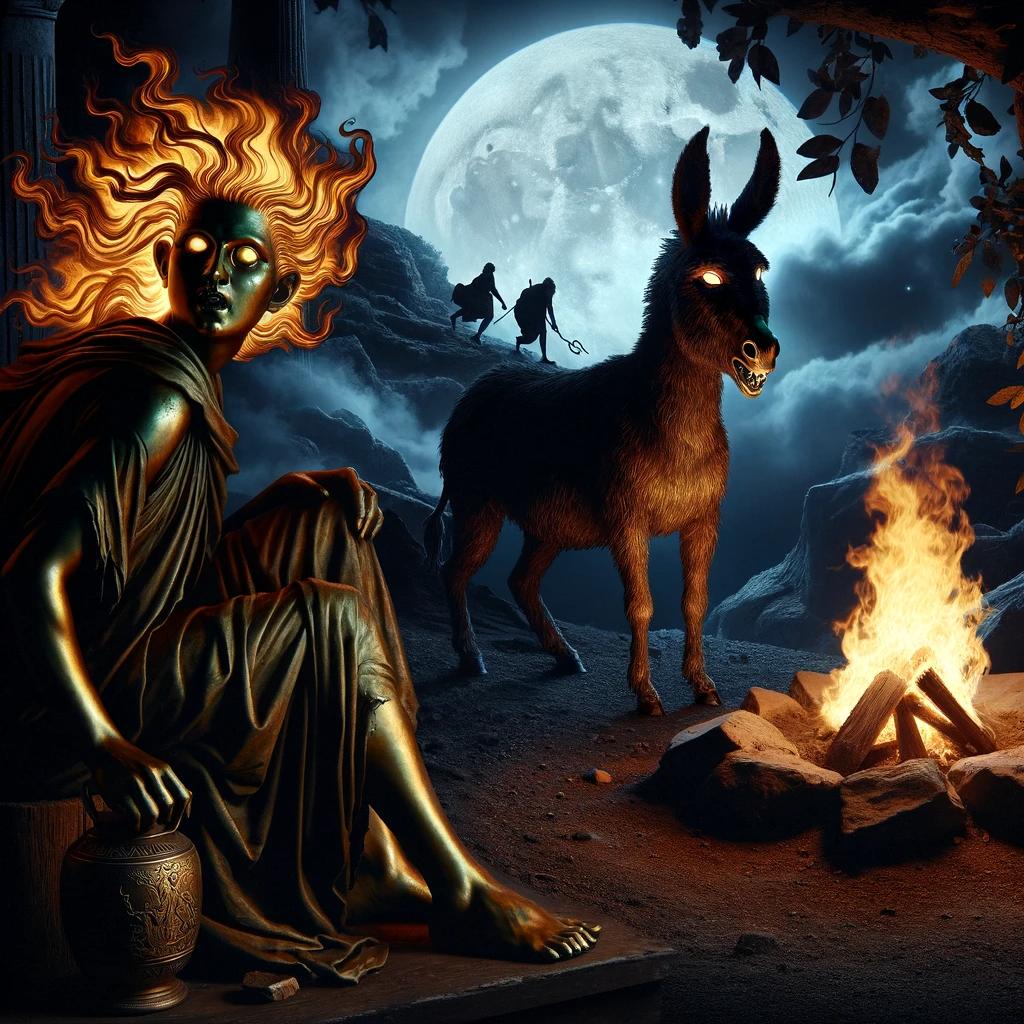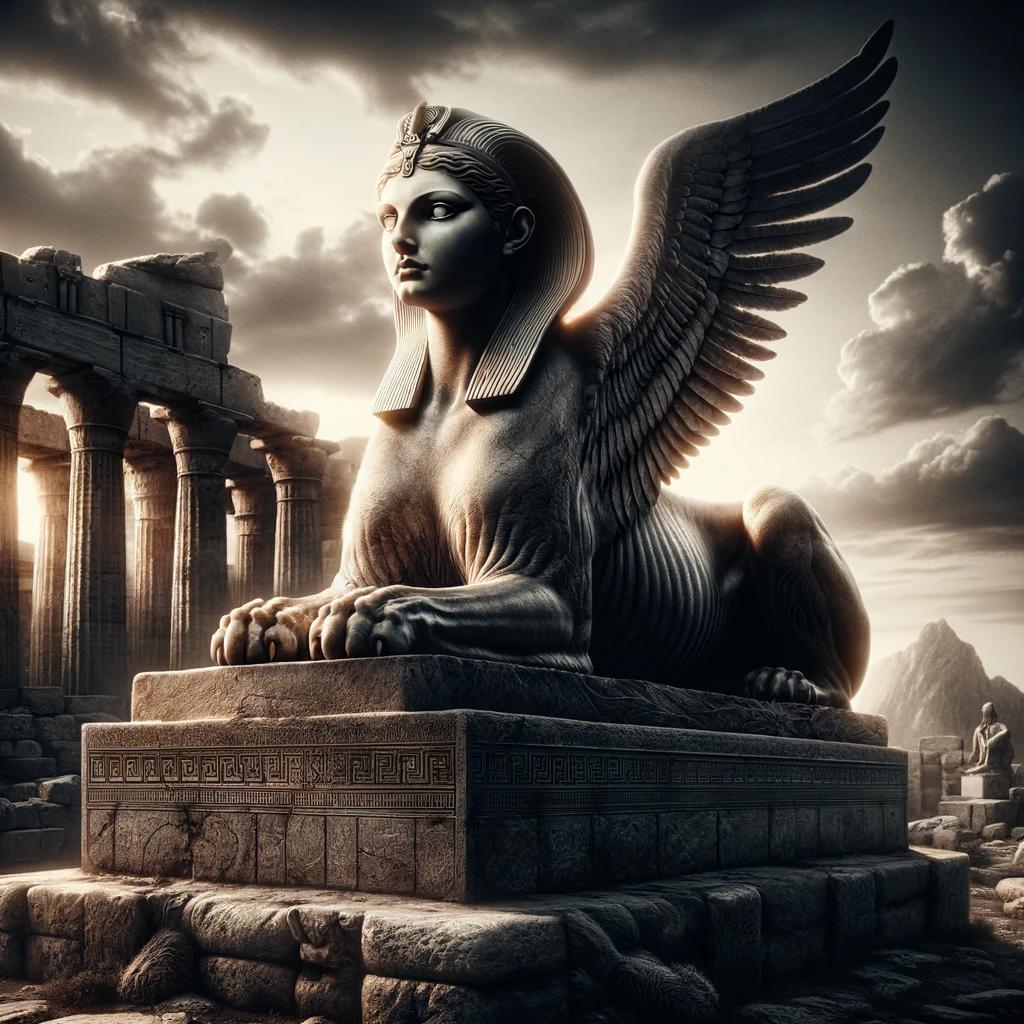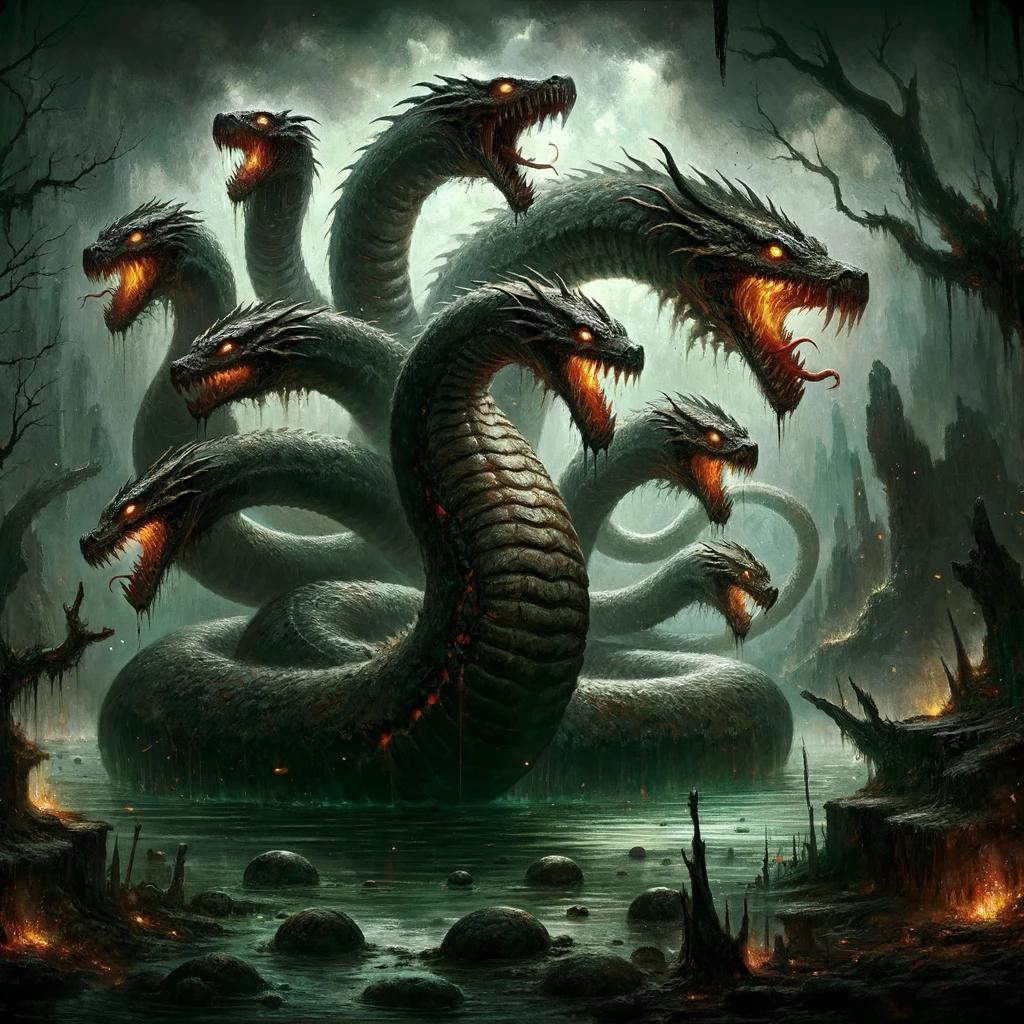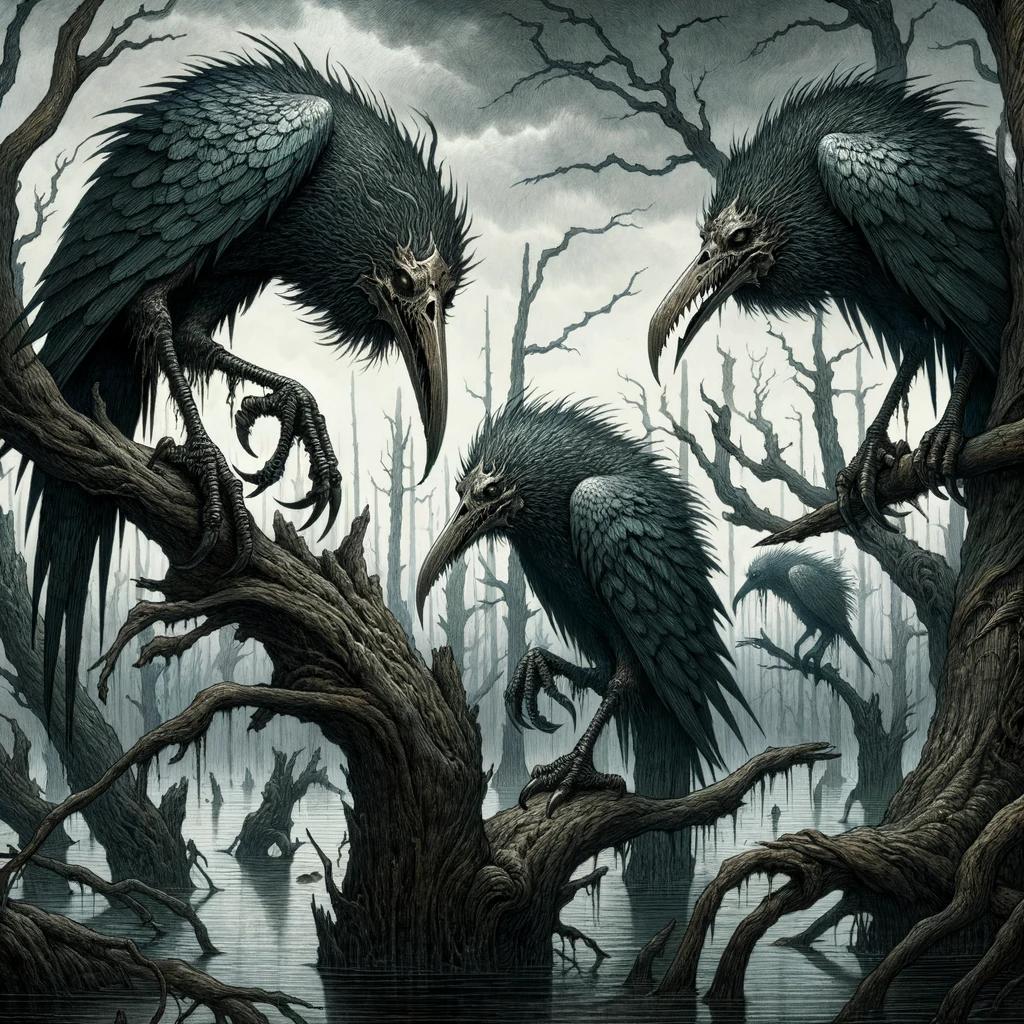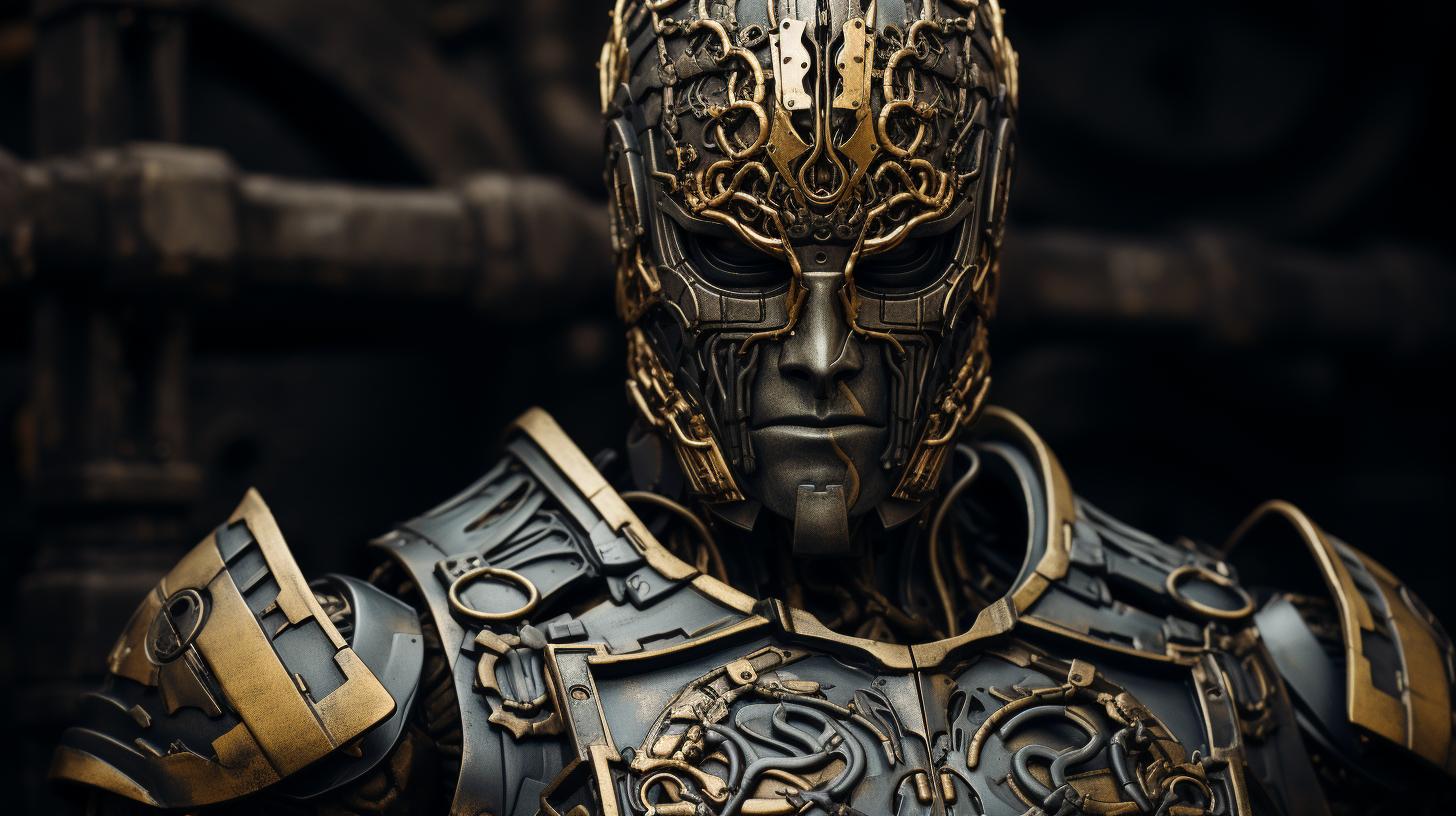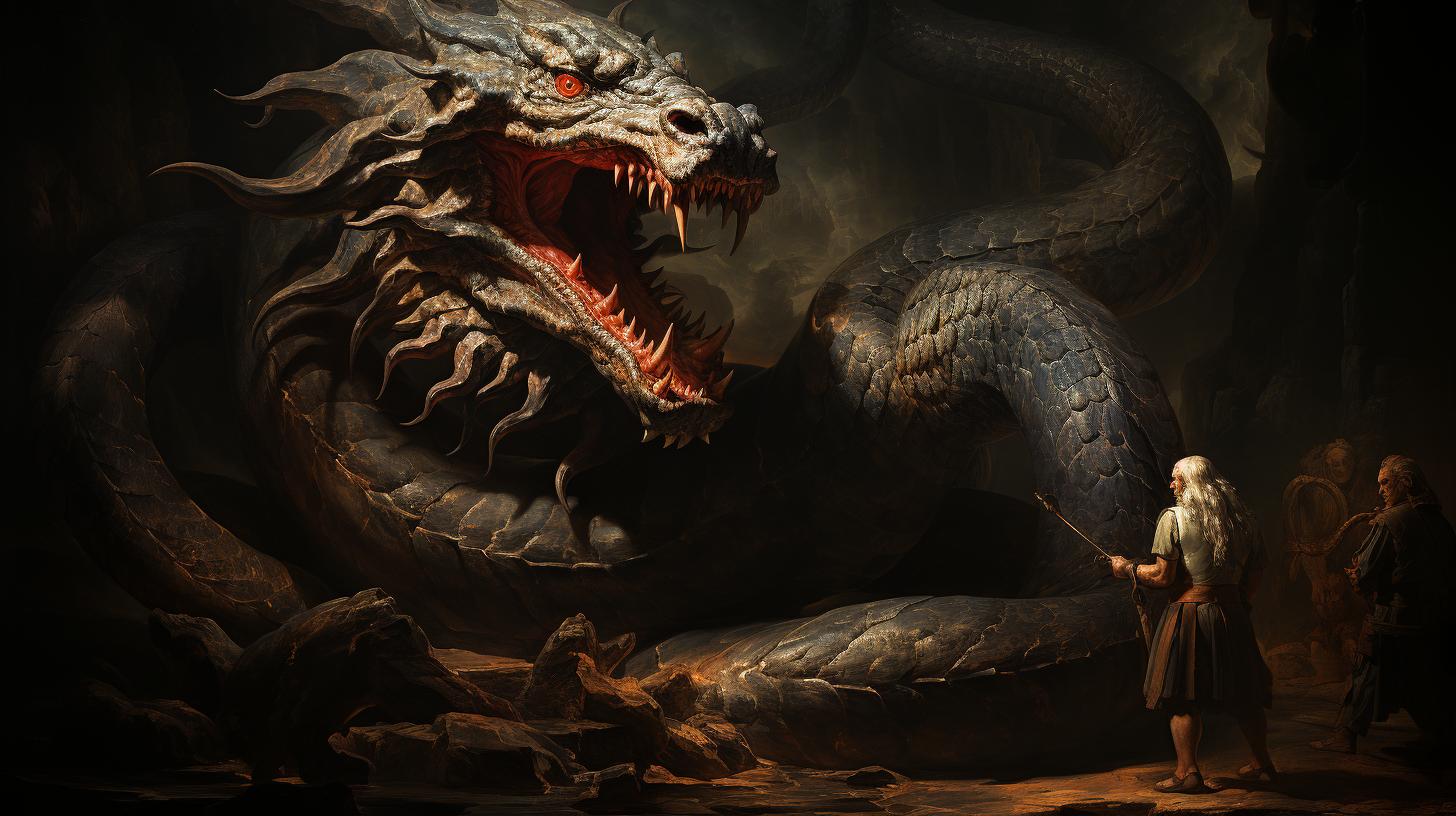Empusa Greek Mythology: Unveiling the Supernatural Creatures of Ancient Greece
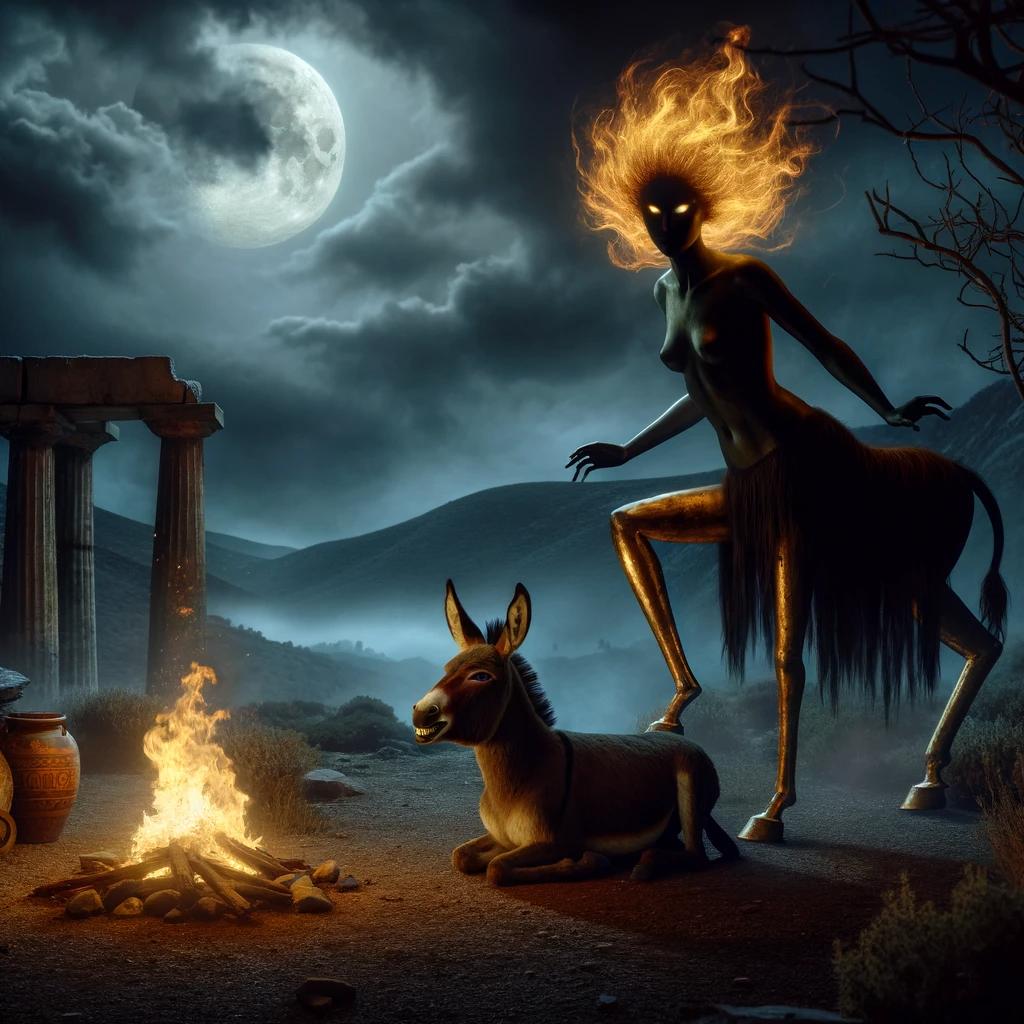
Empusa, a supernatural creature in Greek mythology, has fascinated the imagination for centuries. With the ability to transform into various forms, Empusa is often depicted as a beautiful young woman with distinctive features: flaming hair and mismatched legs, one made of bronze and the other resembling a donkey.
Associated with Hecate, the Greek goddess of witchcraft, Empusa and other nightmarish daemons are said to be under her command. This article explores Empusa’s origins, abilities, and connections to other mythical creatures, as well as its presence in modern folklore and literature.
Empusa Greek Mythology: Unveiling the Supernatural Creatures
Welcome to the enchanting world of Empusa Greek Mythology, where we delve into the mysteries surrounding these captivating supernatural creatures. This section provides an overview of Empusa in Greek mythology, exploring their abilities, transformations, and connections to other mythical beings.
Join us as we unravel the fascinating narratives intertwined with Empusa’s presence in ancient Greek folklore.
Overview of Empusa in Greek Mythology
In this section, we delve into the fundamentals of Empusa’s existence in Greek mythology. Discover their origins, their role in ancient Greek society, and the significance they held in the belief system of the time.
Gain a deeper understanding of Empusa’s place within the pantheon of mythical creatures that populated the Greek mythological landscape.
Empusa’s Abilities and Transformations
Unleash your curiosity as we explore the extraordinary abilities and shape-shifting transformations attributed to Empusa. From their mastery of disguise to their mesmerizing powers, dive into the realm of Empusa’s supernatural capabilities and unravel the implications of their unique traits.
The Connection Between Empusa and Hecate
Unlock the intricate ties between Empusa and Hecate, the revered goddess of witchcraft. Explore the depths of their relationship, examining the legends and myths that link these two powerful entities together.
Delve into the mysterious connection that binds Empusa and Hecate in the realm of Greek mythology.
Empusa’s Relationship with Lamia in Greek Mythology
In this section, we delve into the intertwined narratives of Empusa and Lamia, another fascinating creature in Greek mythology. Explore the legends and stories surrounding their relationship, uncovering the shared themes and symbolism that exist between these mythical beings.
Exploring the Harpies in Greek Mythology
Embark on an exploration of the Harpies, mythical creatures closely associated with Empusa in Greek mythology. Unearth the tales of these avian creatures and their connection to Empusa, delving into the captivating encounters and shared mythical elements that bind them together.
Understanding Lamia 5e and its Role in Greek Mythology
Investigate the significance of Lamia 5e, a creature introduced in the popular game Dungeons & Dragons, and its roots in Greek mythology. Examine how this adaptation of Lamia connects with the ancient myths surrounding Empusa, uncovering the fascinating role they both play within the context of Greek mythology.
The Mythical Origins of Empusa and its Cultural Significance
The Ancient Greek Legend of Empusa
According to ancient Greek legend, Empusa is a supernatural creature whose origins can be traced back to Greek mythology. She is often depicted as a demonic figure with the ability to transform into various forms.
Empusa’s legend has captured the imaginations of people throughout the centuries, and her unique characteristics, such as fiery hair and mismatched legs, have added to her mystique.
Depictions of Empusa in Ancient Art and Literature
Empusa’s presence can also be found in ancient Greek art and literature, where she is often depicted as a beautiful young woman.
However, her true nature is revealed through her distinct features, including her flaming hair and one leg made of bronze, while the other is that of a donkey. These artistic representations serve as visual reminders of her otherworldly attributes and her role as a fearsome and mesmerizing creature.
Empusa’s Role in Ancient Greek Society and Beliefs
In ancient Greek society, Empusa held a significant place in folklore and beliefs. She was believed to be under the command of Hecate, the goddess of witchcraft. As one of the terrifying daimones of the night, Empusa and her counterparts were believed to answer to Hecate and carry out her commands.
Hecate’s association with Empusa and other supernatural beings further solidified her reputation as a mysterious and powerful deity connected to the macabre and supernatural.
In conclusion, the mythical origins of Empusa and her cultural significance in ancient Greece are deeply rooted in Greek mythology.
The ancient legends surrounding Empusa, her depictions in art and literature, and her role in Greek society and beliefs all contribute to the enduring fascination with this captivating and enigmatic creature.
Empusa in Modern Culture and Literature
In modern culture and literature, Empusa’s presence continues to captivate and inspire. Let’s explore different aspects of how Empusa is represented in contemporary folklore, its presence in literature and popular works, and how it is often compared to modern vampire legends.
Empusa’s Representation in Contemporary Folklore
Empusa, with its supernatural qualities and striking appearance, has found a place in contemporary folklore. It is often depicted as a seductive and dangerous entity, lurking in the shadows. In urban legends and local tales, Empusa is known to haunt dark and desolate places, preying on unsuspecting victims.
Empusa’s Presence in Literature and Popular Works
The allure of Empusa has also extended into the realm of literature and popular works. In various novels, short stories, and poems, writers have drawn upon the rich mythology surrounding Empusa to create gripping and intriguing narratives.
Authors delve into Empusa’s ability to transform, her menacing nature, and her connection to other supernatural beings, adding depth to their stories.
Empusa’s presence can also be seen in the world of fantasy and speculative fiction.
Renowned authors like Neil Gaiman have incorporated Empusa into their works, weaving her into intricate plots and exploring her complex character.
Comparing Empusa with Modern Vampire Legends
Empusa’s depiction often draws comparisons with modern vampire legends. While there are similarities in their seductive nature and their ability to shape-shift, Empusa possesses distinct attributes that set her apart. The combination of flaming hair, mismatched legs, and her association with Hecate adds a unique dimension to Empusa, setting her apart from traditional vampire lore.
These comparisons highlight the enduring fascination with Empusa throughout history and the parallels drawn between ancient Greek mythology and modern supernatural folklore.
The Influence of Empusa on Greek Mythology
Empusa, a captivating figure in Greek mythology, holds significant influence within the realm of mythological narratives. Her presence is evident in various aspects of Greek mythology, ranging from her impact on storytelling to her role among legendary creatures.
Additionally, Empusa carries profound symbolism and interpretations in ancient Greek culture. This section delves into the ways in which Empusa’s influence has shaped and enriched the tapestry of Greek mythology.
Empusa’s Impact on Mythological Narratives
As a prominent figure in Greek mythology, Empusa’s impact can be seen in the development and evolution of mythological narratives. Her unique characteristics, such as her ability to transform and her distinctive appearance, have inspired countless stories and tales throughout history.
Empusa’s inclusion in these narratives lends a sense of mystery and allure, often captivating audiences with her supernatural abilities and enigmatic nature.
Empusa’s Role in Legendary Creatures of Greek Mythology
Within the pantheon of Greek mythology, Empusa occupies a significant position among legendary creatures.
Her association with other mythical entities, such as Lamia and Harpies, contributes to the intricate web of interconnected beings. Empusa’s presence adds depth to the mythological landscape, showcasing the diverse range of supernatural beings that populate the ancient Greek legends.
Her portrayal as a seductive and fearsome creature adds intrigue and excitement to the tales she inhabits.
Empusa’s Symbolism and Interpretations in Ancient Greek Culture
In ancient Greek culture, Empusa’s symbolism and interpretations were multifaceted. Her fiery hair and mismatched legs symbolized her transformative abilities and otherworldly nature. Empusa’s association with Hecate, the goddess of witchcraft, linked her to themes of magic and the supernatural.
Furthermore, her depiction as a seductress and tormentor of men conveyed societal fears and anxieties surrounding desire and temptation.
The Significance of Hecate in Empusa’s Narrative
Hecate, an enigmatic goddess in Greek mythology, holds great significance in the narrative of Empusa. Her role in Greek mythology revolves around her connection to witchcraft, the supernatural, and the macabre.
Understanding the significance of Hecate provides insights into Empusa’s origins, powers, and interactions with other mythical beings.
Understanding Hecate’s Role in Greek Mythology
Hecate is a complex and multifaceted deity associated with various aspects, including magic, crossroads, ghosts, and creatures of the night. In her role as a goddess of witchcraft, she governs the mystical arts and is often depicted as a powerful sorceress, capable of bestowing blessings or enacting curses.
Worship of Hecate was widespread throughout ancient Greece, particularly in rites performed during the dark of the moon or at crossroads. She was often invoked by those seeking protection, guidance, or assistance in matters related to magic and the supernatural.
Hecate’s Connection to Empusa and Other Supernatural Beings
Hecate’s relationship with Empusa is a crucial aspect of Empusa’s mythology. While some accounts suggest Empusa is Hecate’s daughter, they are often depicted as allies or comrades. As the goddess of the night, Hecate commands and influences various formidable nocturnal daimons, including Empusa.
Empusa’s association with Hecate further emphasizes her role as a demonic or monstrous entity. It is through Hecate’s influence that Empusa derives her powers and finds her place among the fearsome beings of the night in Greek mythology.
The Worship and Rituals Dedicated to Hecate
Hecate’s cult and worship were unique and distinct, characterized by rituals and ceremonies tailored to her mysterious nature. Devotees honored Hecate through offerings, sacrifices, and prayers, seeking her favor and protection in matters related to magic, crossroads, and the spiritual realm.
Her devotees often performed rituals in sacred places such as shrines, temples, or crossroads during specific times, such as the eve of the new moon or during nights associated with witchcraft.
These rites aimed to invoke Hecate’s presence, receive her guidance, or obtain her assistance in magical endeavors.
In summary, the significance of Hecate in Empusa’s narrative lies in her role as a powerful deity associated with witchcraft, magic, and the supernatural.
She influences Empusa and other nocturnal creatures, while her worship and rituals provide insights into the practices and beliefs surrounding her mystical realm in ancient Greece.
Empusa Greek Mythology: Fact vs.
Fiction
The section on Empusa Greek Mythology examines the line between historical facts and mythical elements surrounding this supernatural creature. By delving into historical accounts and sources, we can attempt to separate reality from fiction and gain a deeper understanding of Empusa’s significance in ancient Greek culture.
Separating Historical Facts from Mythical Elements
In this subsection, we explore the challenges of differentiating between the historical truths and mythical aspects of Empusa’s story. By critically analyzing ancient texts and archaeological evidence, we aim to uncover the authentic origins and characteristics of Empusa.
Historical Accounts and Sources on Empusa
Here, we delve into various historical accounts and sources that mention Empusa in Greek mythology. From ancient writings to artistic depictions, we examine the primary sources that provide insights into Empusa’s existence and role in ancient Greek society.
Interpreting Empusa’s Mythology in a Modern Context
This subtopic explores how Empusa’s mythology has been interpreted and adapted in modern times. We analyze the contemporary significance of Empusa’s story in literature, art, and popular culture, examining the ways in which this ancient mythological creature continues to captivate and intrigue audiences today.
Exploring Other Greek Mythological Creatures Related to Empusa
In Greek mythology, Empusa is just one of many fascinating creatures that captivate our imaginations. Let’s delve into the legends and attributes of other mythical beings connected to Empusa.
Investigating Lamia’s Legend and Attributes
Lamia, a spectral creature, lures and seduces young men, feeding on their blood and flesh.
Legends suggest that Lamia possesses a serpent-like tail, adding to her allure and terror. This exploration will unravel the origins, characteristics, and significance of Lamia in Greek mythology.
Unveiling the Myth of Harpies in Greek Mythology
The harpies, winged female creatures with the head and torso of a woman but bird-like claws and wings, are intriguing counterparts to Empusa. This section unveils the captivating myth of the harpies, their role in Greek mythology, and their connection to other supernatural beings.
Comparing Empusa, Lamia, and Harpies: Similarities and Differences
- Appearance:
- – Empusa: A beautiful woman with flaming hair and mismatched bronze and donkey legs.
- – Lamia: A seductive figure with serpentine features and a taste for human flesh.
- – Harpies: Winged creatures with female upper bodies and bird-like lower bodies.
- Attributes:
- – Empusa: Known for her shapeshifting abilities and connection to Hecate.
- – Lamia: Associated with seduction, vampiric traits, and a tragic backstory.
- – Harpies: Symbols of punishment, often torturing and stealing from humans.
This section compares and contrasts Empusa, Lamia, and Harpies, shedding light on their unique qualities and their significance in Greek mythology.
Empusa Greek Mythology in Different Historical Periods
Empusa’s Relevance in Ancient Greek Society and Beliefs
During ancient Greek society, Empusa held significant relevance within their beliefs and culture. She was regarded as a fearsome demon and a symbol of supernatural power. Associated with nightmarish appearances, Empusa exemplified the Greeks’ fascination with the dichotomy of beauty and terror.
Ancient Greek society considered Empusa a cautionary figure, warning individuals of the consequences of engaging with supernatural entities and dabbling in dark magic.
Empusa and its Evolution in Later Periods of Greek Mythology
As Greek mythology evolved through different historical periods, Empusa’s role and characteristics underwent transformations. In later periods, her image adapted to align with the changing beliefs and mythological interpretations of the time.
Empusa’s powers and attributes became intertwined with other monstrous creatures, such as vampires, contributing to the development of folklore and legends surrounding these entities. This evolution reflected the dynamic nature of Greek mythology as it incorporated new elements into the existing narrative.
Empusa’s Role in Greek Mythology after the Rise of Christianity
After the rise of Christianity in Greece, the way Empusa was portrayed in Greek mythology underwent significant changes. With the advent of Christian beliefs, Empusa and other supernatural creatures from Greek mythology were often demonized or reinterpreted as symbols of evil.
Their roles shifted to fit the moral framework of Christian narratives, where they were often depicted as adversaries to righteous characters. Despite these changes, Empusa continued to maintain her place in Greek folklore, albeit with altered significance and associations in the context of Christianity.
.

